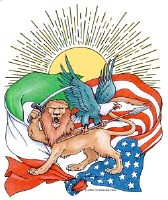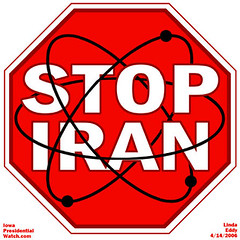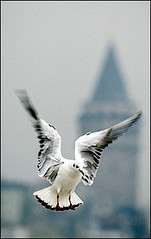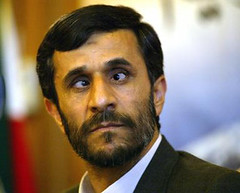Thursday, May 29, 2008
WHY IRAN WILL FIGHT NOT COMPROMISE
Alan note: The analysis is still valid though unless the Asia Times made a date error, the article shows as being posted May30th, 2007, thus about a year ago.
Some elements will have changed over the past year, including a big schism in the top ranks of the Mullahs, with Ahmadi-Nejad finding himself increasingly opposed for his mismanagement of the economy, his aggressive attitude toward the West and hard line on nuclear power. All of which could invite an attack on Iran that his opponents like Ali Larijani and "ayatollah" Rafsanjani feel can be delayed indefinitely by "talk".
By Spengler
What can the West offer the Islamic Republic of Iran in return for giving up its nuclear ambitions and kenneling its puppies of war?
The problem calls to mind the question regarding what to give a man who has everything: cancer, AIDS, Alzheimer's, diabetes, kidney failure, and so forth.
Iran's economy is so damaged that it is impossible to tell how bad things are. Except perhaps for the oilfields of southern Iraq, and perhaps also northern Saudi Arabia, there is nothing the West can give Iran to forestall an internal breakdown.
Iranian dissidents put overall unemployment at 30% and youth unemployment at 50%. Government subsidies sustain a very large portion of the population;
42% of the non-agricultural population is employed by the Iranian state, compared with 17% in Pakistan.
Within fewer than 10 years, Iran will become a net importer, at which point the government no longer will be able to provide subsidies. Iran's economic implosion is a source of imminent strategic risk.
Alan note: Oil wells needing care and servicing are calculated to stop producing enough oil to satisfy the need of internal demand, let alone export it for revenue.
While the Mullahs control probably the second largest natural gas reserves, their technology for liquefying this uses outdated methods and sale of the MOST MODERN technology, an USA method, has been denied to them. Also development of the huge gas fields needs many more years. Even with already conracted Chinese help.
Plus foreign investment to develop oil and gas reserves , pretty much except by the Chinese has run into difficulties including from UN samctions.
What most analysts, including this writer, foresaw as a medium-term problem seems to have confronted Iran much sooner than expected. The present inflation rate of about 20%, driven by a 40% rate of monetary expansion, suggests that government resources are already exhausted.
Governments resort to the printing press when they no longer can raise sufficient funds through taxation, sales of state-owned commodities such as oil, or borrowing. That is surprising, considering that Iran reported a current-account surplus of US$13 billion last year.
The fact that Iran cannot stabilize its currency suggests a breakdown of political consensus within the regime, and a scramble by different elements in the regime to lay hands on whatever resources it can.
Another possibility is that the official numbers are entirely false, and that Iran already has fallen into a current-account deficit.
Alan note: specially the way the Mullahs have been subsidizing Hezbollah and other terror groups, helping Syria buy arms from the Russians and paying for North Korean for testing of nuclear and rocket technology.
In a May 19 statement reported by the official Islamic Republic News Agency (IRNA), President Mahmud Ahmadinejad denied a report that Iran's imports now exceed $60 billion, against an official estimate of $45 billion.
This sort of discrepancy typically occurs when capital flight is disguised as imports through fraudulent invoices and similar devices.
A small current-account deficit would be of little concern for a nation with normal access to world capital markets, but Iran is unable to borrow.
That is the background to Ahmadi-Nejad's decree last week reducing private and state bank lending rates to 12% from 14%, that is, 5-10 percentage points below the rate of inflation.
If Ahmadi-Nejad were in the pay of a hostile intelligence service, he could not have found a more effective way to sabotage Iran's economy. If the price of goods rises faster than the cost of money, everyone who can will borrow money to purchase and hoard goods.
The result will be higher prices and reduced economic activity, and the eventual prospect of hyperinflation, which no government ever has survived. Last week's rate reduction augmented the incentives for capital flight.
Ahmadi-Nejad took this foolhardy step against the explicit advice of Iran's economic authorities, which suggests that the economic suffering of his political base commanded his undivided attention. After increasing gasoline prices earlier in the month, (May 2007 is thus correct) he evidently found it necessary to throw his constituents a bone.
Iran's prospective demographic implosion, I have argued for two years, pushes Tehran toward imperial expansion.
[1] It is difficult to see a way out for Persia's pocket empire; the country exports nothing but oil, carpets, pistachios and dried fruit (excluding the growing human traffic in Persian women), and manufactures nothing the world will buy.
Its most pressing problem, unemployment among the 60% of its population now under the age of 30, will turn into a much worse problem as this generation ages.
In two decades Iran will have half as many soldiers and twice as many pensioners. If a future catastrophe is inevitable, its impact has a way of leaping back into the present.
Monetary disorder of the magnitude we now observe suggests an internal collapse of confidence. What strategic consequences ensue from Iran's economic misery?
Broadly speaking, the choices are two. In the most benign scenario, Iran's clerical establishment will emulate the Soviet Union of 1987, when then-prime minister Mikhail Gorbachev acknowledged that communism had led Russia to the brink of ruin in the face of vibrant economic growth among the United States and its allies.
Russia no longer had the resources to sustain an arms race with the US, and broke down under the pressure of America's military buildup.
The second choice is an imperial adventure. In fact, Iran is engaged in such an adventure, funding and arming Shi'ite allies from Basra to Beirut, and creating clients selectively among such Sunnis as Hamas in Palestine.
I continue to predict that Iran will gamble on adventure rather than go the way of Gorbachev. A fundamental difference in sociology distinguishes Iran from the Soviet Union at the cusp of the Cold War.
Josef Stalin's terror saw to it that the only communist true believers left alive were lecturing at Western universities. All the communists in Russia were dead or in the gulags.
By the 1980s, only the most cowardly, self-seeking, unprincipled careerists had survived to hold positions of seniority in the communist establishment.
Only in the security services were a few hard and dedicated men still active, including Vladimir Putin. These were men who saw no reason to fight for communism 70 years after the Russian Revolution.
Iran, however, is not 70 years away from its revolution, but fewer than 30 years away. Ahmadi-Nejad typifies the generation of Revolutionary Guards who followed the ayatollah Ruhollah Khomeini in 1979, and now hold senior positions in the state and military.
Alan note: though their loyalty - to anyone in particular - is coming ever more into question.
Ahmadi-Nejad blames the country's economic problems on "certain elements", presumably his opponents within the regime, alleging that government agencies have falsified statistics to discredit him.
As noted, he denied reports that imports were fully a third higher than officially reported, an astonishing statement for a head of government to have to make.
The president also claimed that unemployment had declined to 11.3% from 11.5% in 2006, adding, "The government is now striving hard to provide employment opportunities for the country's jobless people."
The IRNA report concluded with this less-than-confidence-building comment about inflation:
On [the] inflation rate, he said the government is quite successful in controlling [the] spiraling inflation rate while other factors such as the country's development projects and worldwide price hikes should be taken into consideration.
"Unfortunately, certain elements are now issuing fabricated statistics and try to tarnish reality, but we strive to remove all existing weaknesses," said the president.
"Certain elements" no doubt refers to Ayatollah Akbar Rafsanjani, his opponent in the 2006 presidential election and leader of the faction more inclined to compromise with the West.
Alan note: Former lowly pistachio orchard owner, now multi-billionaire Rafsanjani, perhaps one of the richest men in the world has a multitude of large projects around the globe, huge desposits in off-shore banks and owns extensive property in various countries. His view of the world and its economy varies totally with Ahmadi-Nejad's "sleep and eat on the floor and little money in the bank" life style. Though he does funnel illegal money toward his relatives.
Rafsanjani continues to maintain excellent contacts in Germany, and European diplomats have placed their hopes on the prospect of his replacing Ahmadi-Nejad.
It would not be out of character for Rafsanjani and his allies to make matters more irksome for Ahmadi-Nejad by diverting large amounts of money out of state revenues into their own pockets.
As a way of changing the Tehran regime, however, pushing Iran toward hyperinflation would be akin to cutting the brake lines of a car to spite its driver, when one is a passenger in the same car.
It is easy to hasten the deterioration of Iran's economy, for it is headed downhill in any event, but very difficult to reverse the process. An old piece of diplomatic wisdom states that one always should give one's enemy a way out.
But I see no way out for the pocket empire of Persia. Ahmadi-Nejad and his generation of Revolutionary Guards will fight, and cautious old men like Rafsanjani will not be able to stop them.
Alan update: the conflicted Revolutionary Guard (IRGC) may no longer fight as well and coherently as they might have a year ago when the above was written. And resent the Bassiji Suppression Forces commander being put in charge over their own commander.
They and their families have recently had to deal with the ruthless Bassijis, who have total law enforcement powers - even to arrest an IRGC member or his relatives. A new angle for the IRGC to handle. Made worse by the lowering influence of their "man" Ahmadi-Nejad, a former IRGC commander himslef.
Subscribe to:
Post Comments (Atom)














No comments:
Post a Comment